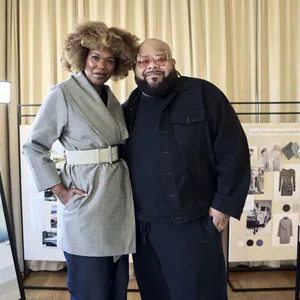Author Stephen Covey once said something that I think is especially relevant to today’s topic: “Most of us spend too much time on what is urgent and not enough time on what is important.” Because if there is one thing that I hear far too many married couples (and if I’m gonna be real, it’s mostly the wives) say is their reason for not making intimacy a priority, it’s that they don’t have enough time.
I think we all can attest to the fact that a part of what comes with adulting is time management — and that includes prioritizing our time wisely. And that’s what brings the quote full circle because, although life does indeed have a way of life-ing, it’s essential — crucial even — to remember that, no matter what may come up that may seem “urgent,” intimacy with your spouse is always going to be important.
And that’s why I (catch the pun) made the time to come up with 10 ways to give you more time to have sex with your man, even if it seems like you don’t exactly have it.
1. Scale Down Your Social Media
 Giphy
GiphyWhenever one of my clients tells me that the reason her sex life with her husband is suffering is because she doesn’t have the time for it, one of the first three questions that I ask her is how much time she spends on social media. If I get “crickets,” I’m automatically rolling my eyes to where she can see it.
Why? Because I am well aware of the fact that most people, on average, spend 2.5 hours A DAY scrolling on social media platforms. And since most people are fine with intercourse lasting anywhere between 7-13 minutes (Google it) — let’s just be real: when it comes to the sex lives that are on life support, it’s not that most of those folks don’t have time, it’s that they don’t make it….and that means they don’t prioritize sex in their relationship. And that is a problem that will only get bigger over time if it’s not addressed — quick, fast, and in a hurry.
If you feel seen, it’s time to power that phone down and ramp up your sex life. Social media will always be there; it’s important that you be proactive about making sure your marriage remains healthy and intact.
2. Shower Together
 Giphy
GiphyI think we all know that if your objective is to get clean(er), you need to take a shower instead of hopping into the bath (because clean water coming out of a showerhead is better than floating dirt in bathwater). So, what’s the plus of bathing? If you want to soothe achy muscles, reduce stress levels, and/or exfoliate your skin, having a bath soak can be a good look. However, since the chance of that being your focus first thing in the morning is slim, why not get “dirty” and clean with your partner in the morning before heading off to work?
Since, reportedly, the average shower lasts eight minutes, and we just discussed that sex tends to be between 7-13 minutes, you could be in there with your man for around 15 minutes and come out with an orgasm and being squeaky clean. Now, what could be better than that, sis?
3. Stop Underestimating Quickies
 Giphy
GiphyI was recently talking to a male friend of mine about how his fiancée would rather have no sex at all instead of a quickie: “That s-it makes absolutely no sense to me because we both are able to get ours whether it’s an hour or 15 minutes.”
Listen, it’s not like I don’t see both sides of the coin on this. As far as she goes, sometimes long foreplay, a ton of romance (check out “Tonight's The Night For A More Romantic Sexual Experience With Your Partner”), and going multiple rounds are very much needed. At the same time, though, a quickie can give you all of the health benefits that longer sessions do, plus the climax.
Ever heard of the saying, “You’re cutting off your nose, just to spite your face?” If you’re turning down quickies just because the sex sessions aren’t as long as what you’re used to (or would prefer), you are a walking definition of the saying. Just because quickies are a compromise, that doesn’t mean that you’re settling (check out “12 Super Solid Reasons To Have A Quickie Every Single Day”). Not. At. All.
4. Eat Other Things than Lunch (Metaphorically Speaking)
 Giphy
GiphyI recently read that close to 50 percent of people skip lunch at least once a week. Chile, why? You’ve earned it, and so you should have it. And if you need more motivation to take what I just said seriously, even if you’re not hungry during lunchtime, use that as an opportunity to enjoy your partner. By law, most lunch breaks are either 30 minutes or an hour, and that’s certainly enough minutes to “get the job done” — even if that means having a standing appointment at a hotel that isn’t too far from where the two of you work. Middle-of-the-day sex is top-tier. If you don’t know, ask some of your girlfriends who probably do.
5. Remember: Oral Sex Counts
 Giphy
GiphyBack when I used to be a teen mom mentor for the local chapter of a national organization, it used to trip me out how much some of the students would try and trick themselves into thinking that oral sex isn’t “real sex.” Nevermind the fact that sex is literally in the term — genitalia is penetrating a body part, you can get STIs/STDs from the act, and, let me tell it, it’s even more intimate.
Anyway, my point here is, even if there doesn’t seem to be enough time for total disrobing (for whatever reason), a satisfying workaround is some cunnilingus and fellatio — believe that. You’ll still get an orgasm. You’ll still feel connected to your partner. And you’ll still get a helluva stress release. Yes, oral sex IS sex — and that needs to be said far more often than it tends to be.
6. Turn Date Night into Sex Dates
 Giphy
GiphyDid you know that 52 percent of couples rarely, if ever, have a date night? That’s super unfortunate, considering date nights are all about being intentional about spending quality time with your partner. That said, if you happen to fall into that percentile, take this as a super loud PSA to start prioritizing dates with your bae. By the way, if you are someone who is pretty good about getting out with your man, at least once a month, try and shoot for twice a month and turn one of those into a sex date — time that is set aside to do nothing more than copulate with your partner (check out “When's The Last Time You And Your Man Had A 'Sex Date'?”). It increases anticipation, and that can intensify the sexual experience on a whole ‘nother level.
7. Get Up Earlier and/or Go to Bed Later
 Giphy
GiphyAgain, we’ve already discussed that you can get what you need (you know, for the most part) in about 13 minutes (give or take 15 minutes of foreplay first) so, at least once a week, why not set your alarm clock to wake up earlier for some morning sex or commit to staying up a bit later for some late-night coitus? Since only 60 percent of couples currently go to bed together at night, this tip could inspire you both to get more pillow talk and cuddling in, too, which are all forms of quality time that pretty much every husband and wife need on some level.
8. Stop Running (So Many) Errands When the Kids Aren’t at Home
 Giphy
GiphyMy goddaughters are 12 and 4, and they’ve got just as much, if not more, of a busy schedule than their parents do. Something that I tend to notice, though, is when they are in their dance, volleyball, acting, or whatever other class they’ve got going on, their parents automatically use that as an opportunity to run all kinds of errands. And while that might be a practical use of time — how smart is it if intimacy with your partner is far and few between?
My two cents? If your kids have activities after school 2-3 times a week, make sure that one of those days is set aside for nothing else but sex. I promise you that no matter how important grocery shopping or eyebrow waxing is, if you’re not making time for your spouse, whether immediately or eventually, that will start to create an avalanche of issues that will make anything else pale in comparison. I see it happen on an almost daily basis.
9. Make the Kids’ “Fun Time” Your Fun Time Too
 Sexy Jessica Alba GIFGiphy
Sexy Jessica Alba GIFGiphyWhen your kids are watching a movie, you could be having sex. When your kids are playing a video game, you could be having sex. When your kids are entertaining themselves in their room, you could be having sex. When your kids are outside with some friends (kids still do that, right?), you could be having sex. When your kids (who are old enough) are making a snack, you could be having sex.
Once children hit a certain age, it’s important to not “helicopter parent” them by feeling that you need to hover over them 24 hours a day. Once they have become self-sufficient enough to do certain things on their own, announce that mommy and daddy will be in the bedroom if they need anything and take advantage of that half-hour or two hours that you’ve got. You’d be amazed how much they’d appreciate you not being on top of them all of the time anyway. #justsayin’
10. Schedule Sex
 Giphy
GiphyAny time someone tells me that they don’t want to schedule sex because it won’t be as good that way, I’m always on some — does scheduling dinner at your favorite restaurant make the meal less appetizing? Does scheduling time with your friends make it less fun? Does scheduling a mani/pedi make it less pampering? Please, let’s just stop. When you schedule something, that means that you’re prioritizing it, and sending a message to your partner that you want nothing more than to spend time with him, intimately, is sexy — plain and simple.
Listen, even though we all get 24 hours in a day, sometimes our to-do lists are so jam-packed that it’s both responsible to get your sex life “on the books.”
_____
You know, when it comes to “having time” quotes, someone once said, “People make time for who they want to make time for. They text, call, and reply to people they want to talk to. Never believe someone who says they’re too busy; If they wanted to be around you, they would.” Do I think this resolve is black and white? No. Sometimes, folks have to wait before you can get back to them.
What I will say, however, is when you signed up to be married, you signed up to have your spouse take precedence over just about everyone and everything else. I will also say that a part of what comes with the marital agreement is sexual activity. Put those two things together, and yes — it’s important to never be too busy to find time, sexually, for your spouse. Besides, if the sex is good, how can it ever not be time well spent, chile? C’mon now.
Let’s make things inbox official! Sign up for the xoNecole newsletter for daily love, wellness, career, and exclusive content delivered straight to your inbox.
Featured image by Giphy
- Could ‘Intimacy Anorexia’ Be Ruining Your Sex Life? ›
- I Absolutely Hate The Phrase 'Make Love.' Here's Why. ›
- Married Folks: Ever Wonder If Your Sex Life Is "Normal"? ›



























